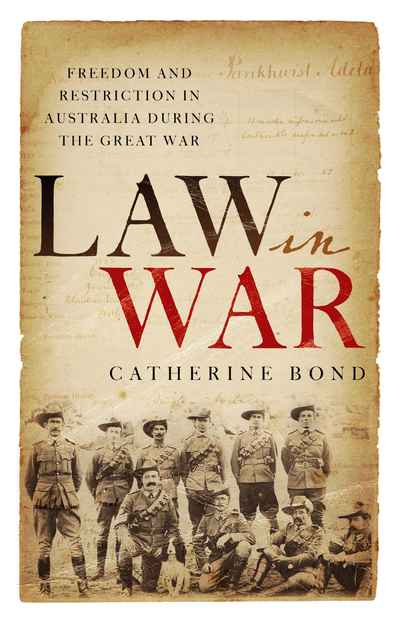The author Catherine Bond is an Associate Professor in the Faculty of Law, UNSW Sydney.

Paperback 272pp., ill., RRP $34.99
Building on her doctoral thesis on the history of Australian copyright law the author has shone a light into this long-neglected element of the home front in Australia during the Great War.
Engagingly written and free of legal jargon the book’s motif is that laws enacted during wartime would have a lasting legacy for Australian society. Despite this, the interwar years and beyond have seen little in the way of studies published on the law or the judiciary in Australia during the First World War.
While this is not a revisionist history, Charles Bean is taken to task, again, for deliberate omissions in his official history of Australia 1914-1918, as is the less influential but significant work (edited by Bean) of Professor Ernest Scott. In an eerie parallel with current day controversies over the content and publication of official history a proposed chapter in Scott’s history dealing specifically with the law, never saw light of day. There were too many men in power with vested interests in how such a study might reflect on them.
Bond emphasizes that while Australian military doctrine for example was modelled on that of Britain, the mother country’s influence on our law regime waned as the war dragged on. Law in War looks at a sample of individuals affected by discrimination and oppression in wartime Australia, a clever device by way of narrative structure and which makes for sobering reading. The author counterbalances these with five case studies of those who benefited in some way though the law.
Not unlike the office of the Auditor-General from 1914 the Attorney-General’s Department was hopelessly under-staffed. It was therefore almost overwhelmed by the volume and breadth of work for which it became responsible when Australia joined the imperial war effort. The author notes the breathtaking (and to this reviewer) reckless speed with which Prime Minister Billy Hughes drafted regulations and laws, one of which for example established the Commonwealth Police. Bond also identifies the critical role of the states’ police in augmenting the meagre resources of the Commonwealth while diverting resources from routine policing.
The courts were often the last resort for ordinary people who were subject to some of Hughes’ more draconian regulations. But some were to be disappointed by, to the modern mind, the questionable morality and propriety of some of the judgments handed down. And it here that the author’s selected case studies come into their own. They are used to support arguments or enhance an understanding of their victims before the law. The saga of Adela Pankhurst is a case in point. But for this reviewer the most poignant chapter is that which deals with three non-Caucasian Australian soldiers. Overall these provide the reader with a sense of the justice system as it was at the time while providing political context.
Bond makes the key point that much of the nation’s wartime legal controls were enacted through regulation, sometimes without parliamentary oversight. Those who have studied our home front are constantly surprised not only by the number of new regulations but the extent to which they governed every aspect of Australian life. Public bewilderment about the scope (and occasionally event the intent) of much war-time regulation looked forward to the same confusion in World War Two.
It is little surprise that neither Hughes nor his Minister of Defence, Senator George Pearce, come away from this study as being either statesmanlike or even-handed. Some of the former’s zeal in drafting laws was petty and vindictive.
One of my personal bugbears when it comes to studies of this kind is the absence of a bibliography. However, the footnotes are extensive and informative for those who wish to read further. I should like to have seen more of Sir Ronald Munro-Ferguson, Australia’s most interventionist Governor-General and his influence on W.M. Hughes regarding the drafting and policing of law and more use made of radical newspapers such as The Worker and The Socialist.
The stated aspiration of the author is to fill the gaps in examining Australia’s wartime regime, and to me she has succeeded rather well. Of course, with satisfaction comes expectation. As Bond and other scholars are aware, there is still much more to be done in this field − particularly regarding the pervasiveness of the War Precautions Act and the role of the judiciary.
This is recommended reading not only for social and military historians but for those who view with concern encroachments on personal freedoms during times of crisis.
Reviewed for RUISV by Michael Tyquin, April 2020
Dr. Michael Tyquin is a consulting historian and author. His most recent book is Madness and the Military: Australia’s experience of the Great War (2019).
Contact Royal United Services Institute about this article.






